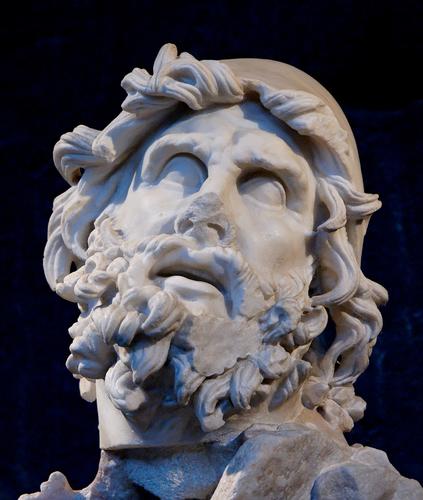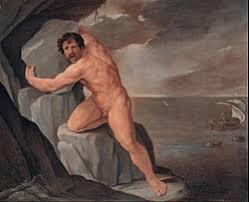Ancient Greek mythology is full of many great figures. There’s Achilles, the legendary warrior who was killed at Troy, and Ajax, the second greatest Greek warrior at that war who committed a tragic suicide. Clytemnestra, the formidable Queen of Mycenae, is worth a mention, as are her husband Agamemnon and brother-in-law Menelaus, who waged the Trojan war in the first place. But this article is not about them – brave, heroic and domineering as they may be. Rather, this article is about another Greek hero, a man who was also present at Troy and a skilled warrior in his own right, but whose greatest strength was in his famously cunning intellect. While other giants of Greek mythology are brash, reckless, violent for no reason, this man was thoughtful, agile in mind, able to charm his way out of trouble and into the beds of beautiful goddesses. He’s even sensitive, in touch with his emotional side, not ashamed to cry in front of his adoring followers. If you haven’t guessed already, the man is, of course, Odysseus. This article will outline why he’s the greatest figure in Greek mythology.
The Trojan War
Odysseus first appears in Homer’s Iliad, the epic poem which tells the story of the Trojan war. He is the King of Ithaca, a small region in western Greece, who, like all the other Kings of Greece, has organised a band of his finest men to join the huge Pan-Hellenic (All-Greek) army that set sail across the Aegean sea to Troy, thought to be in modern day Turkey. They are there ostensibly on the behalf of Menelaus, King of Sparta, whose wife Helen had eloped with one of the princes of Troy, Paris. However, as Homer makes clear, the Greek motives are not all that noble. Indeed, Menelaus’ brother, Agamemnon, the King of Mycenae, barely disguises the fact that he is there not for Helen but to conquer Troy and wipe it off the face of the earth.
This attitude eventually leads to the horrendous sacking of Troy, where the Greek army enthusiastically slaughters the Trojan people and razes the city to the ground. This over-indulgence later has fatal consequences for Agamemnon and many of his fellow Greeks, so displeased are the gods with the brutal rampage, and Odysseus of Ithaca is not spared form their wrath. Though he will not die, he will not be permitted to return home to his wife and son any time soon. Instead, he is forced on an epic, ten-year journey – an Odyssey – through the Aegean and eastern Mediterranean as punishment for his part in the massacre at Troy. Indeed, he had a pretty big part to play in the tale: it was Odysseus who came up with the idea of constructing the famous wooden horse to gift to the people of Troy, and he was one of the elite warriors who hid themselves in the horse and opened the gates of the city for the Greek army to rush through at night.
The Odyssey
Homer starts his second epic poem by setting the scene in Odysseus’ homeland. Ten years after the sacking of Troy and twenty years since he left Ithaca he has not returned, and a gang of bombastic suitors occupy his palace, trying to win the hand of his wife, Penelope. In the background is his son, Telemachus, who was an infant when Odysseus left for Troy and has grown into a shy, unconfident man in the absence of his father. Telemachus and Penelope yearn to rid themselves of the suitors, but with Odysseus assumed by most to be dead and with Telemachus so unsure of himself, getting rid of the suitors is no easy task.
Of course, Odysseus is not dead. He is sitting on the island of Ogygia, where is held captive by the beautiful nymph (a sort of semi-goddess), Calypso. ‘Captive’, is probably not the right term, because Calypso is desperately in love with Odysseus and they sleep together regularly. But all poor Odysseus wants to do is go home, which Calypso will not allow. So it is that he sits there, staring out to sea, wiping the tears from his eyes (this is not the last time we will see him crying). So, how did it all come to this? To answer that, Homer takes us back to the start of Odysseus’ epic journey.
Admittedly, the story does not start so positively. After defeating the Trojans, he and his fellow Ithacans boarded their ships and set sail for home. Their first stop was Ismara, the land of a people called the Cicones, and, apparently not content with the massacre at Troy, they proceeded to plunder the land’s resources and kill many of the people. So far, not so good. The next stop is more bizarre – they arrive in a land of the lotus flowers and are warned not to indulge with the flowers, but some of the men do and are instantly hooked on the drug, feeling euphoric and forgetting all about home. Odysseus has to order that they are forcibly put on the ships and they depart swiftly.
The next stop is one of the most famous and perhaps one of Odysseus’ finest hours. Hearing the bleating of sheep on an island they sail past, he leads a band of men ashore and they find a huge cave full of large sheep and cheese. They happily indulge themselves until they realise with horror the reason why everything on the island is so large – it is the home of the cyclops’, huge one-eyed monsters who allegedly built Mount Olympus for the gods. The cyclops whose cave they had wandered into, Polyphemus, cannot believe his luck and casually picks two of the Ithacans up, smashes their heads against the wall and eats them. Satisfied, he lies down to sleep and Odysseus is left to fret about how they might escape. His men want to kill Polyphemus as he sleeps, but wise Odysseus reminds them that they will not be able to move the huge boulder that seals the cave. They must figure out a way to get him to open the entrance and escape.
A few of Odysseus' unfortunate comrades fall victim to the fearsome cyclops Polyphemus (wikipedia)
The following evening, Odysseus puts his plan into effect – but not before two more of his comrades are eaten. He offers some of their wine to the cyclops, who quickly becomes drunk. Just as he drifts off to sleep, he asks Odysseus his name. ‘No body’, he cunningly replies. When Polyphemus falls asleep, the men fashion a large stake out of wood and drive it into his eye. Writhing around in agony, he tries to grab the men but they all manage to dodge him, and as he screams for help he is laughed at by his fellow Cyclops’ when he proclaims ‘No body has blinded me!’. In the morning he removes the boulder to the cave to let his sheep out, as he does every morning, but stands at the entrance so he can feel for any men who might be escaping. This is no matter for Odysseus, who orders his men to hold on to the sheep’s bellies so that Polyphemus does not realise that they have escaped. Eventually, the Cyclops realises that his cave is empty and charges to the seafront, where the Ithacans are frantically rowing away. In a fury, the giant blindly hurls rocks in the direction of the sea, prompting laughter, arrogance and one giant mistake from Odysseus, whose ego won’t allow the wounded monster to not know who he has fallen victim to. He proudly announces that it was he, Odysseus, who blinded him, allowing Polyphemus to place a curse on him. Anyone placing a curse on you is bad news, but Polyphemus actually happens to be the son of Poseidon, god of the sea. That’s really bad news.
In this episode, we see the paradox of Odysseus, who can be cunning and brilliant in one minute but capable of stupefying arrogance and bravado the next. Indeed, it is this bit of arrogance and the curse that comes as a result of it that will cost his men their lives and ensure that he does return home for many more years than was necessary. But the greatest heroes in history and literature are never perfect, and Odysseus’ complex character only serves to make him more compelling. Moreover, he’s got a lot to be arrogant about, as we shall see more of.
After escaping the cyclops, Odysseus and his men find the island of Aeolus, the god of wind. So charming and heroic is Odysseus that Aeolus grants him the greatest gift of all – a bag full of enough wind to blow them back to Ithaca. Ecstatic, Odysseus gets going but does not tell his men what is in the bag; only that they are forbidden to open it. Of course, this only makes them more inclined to open it and they do so while Odysseus is asleep. This results in a bumpy ride in the exact opposite direction from which they want to go, with Odysseus crying about his misfortune, ignoring the fact that if he had only communicated better with his men then he would not have encountered such misfortune. Again, Odysseus is by no means a perfect man.
Having been blown a long way from home the men find themselves on the island of Aeaea, home to a sorceress named Circe. Circe takes a disliking to them and turns some of them into pigs, but she takes a liking to Odysseus and comes to a deal with him, where she promises to turn the men back into their human form if he would be so kind as to take her to bed. Fine, says Odysseus, and Circe becomes just the latest semi-divine woman to enjoy Odysseus’ bed chamber prowess. In fact, she enjoys his company so much that she keeps him on the island for a year, and all the while Odysseus’ men sit on their hands and wonder when their King will have the impetus to leave. For his part, Odysseus tries to imply that he is an unwilling hostage of Circe, but this does not really tally with his enthusiasm to get back in the sack with her and the fact that she agrees to let him go almost as soon as he asks.
Odysseus does leave the island, but not before a divinely sanctioned trip to the underworld to see a prophet. While here he sees a few of the other Greek heroes of Troy, as well as his mother Anticlea, who has died in his absence. Our hero is naturally emotional at this encounter and at the fact that the prophet, Tiresias, predicts that he will not return to Ithaca without great struggle.
Back in the mortal world, Odysseus and his men set off on a hard slog during which his comrades all perish. Firstly, they pass the Sirens, women who lure sailors to certain death with their beautiful singing voices. Odysseus orders his men to plug their ears and tie him to the mast of the ship, so that none of them are tempted to sail off to their doom. Next, they pass the monsters Skylla and Charybdis, who unfortunately eat several of his men. After this they arrive on the island of Helios, god of the sun, and Odysseus relays to his men what he was warned about by Tiresias – they are not to eat the cattle on Helios’ island. But the men are so starved that they cannot resist, and when they leave the island a huge storm drowns everyone…except Odysseus, who ends up on Calypso’s island, where he essentially remains as a sex slave for the next seven years.
How does Odysseus get home?
The goddess Athena, who – like so many goddesses – has taken quite a liking to Odysseus, implores her father Zeus to allow Odysseus to leave Calypso’s island. Zeus agrees, and Calypso is forced to reluctantly let him go. He sets sail for home, and it finally looks as though he may make it. But don’t forget, there is still one god who is very angry with Odysseus indeed – Poseidon. Although he accepts that Odysseus is fated to return home eventually, Poseidon sees no reason why he can’t give him as much trouble as possible along the way, and sends a devastating storm after which Odysseus ends up in Scheria, home of the Phaeacians. It is actually here that we hear all of Odysseus’ tale, as the Phaeacian King and Queen promise to allow him safe passage to Ithaca so long as he tells him what he has been doing all these years.
Satisfied with Odysseus’ incredible tale of gods, goddesses and cylops’, the Phaeacian King and Queen grant Odysseus some ships to sail home. Finally, after 20 years, and having lost all of the comrades who left with him, he sets foot on his beloved homeland.
A triumphant return
As already outlined, our hero does not return to a happy homeland. Disguised as a beggar, he seeks out his old cattleherd, Eumaeus, who accepts him warmly into his modest home. Before long, he finds his son Telemachus, with whom he has an emotional re-union. Telemachus tells him of all the ills that have been committed by the dastardly suitors, and together they devise a plan to kill them.
The next day, still disguised as a beggar, Odysseus arrives at the palace and is subjected to remorseless harassment by the suitors. Penelope, who has a sixth sense that the beggar could well be her husband, organises a competition. She promises to marry any man who can pull back Odysseus’ bow and fire an arrow through twelve axes. The men try and try, but none can do it, until it is Odysseus’ turn. The men scoff at the idea that the beggar could complete the challenge, but complete it he does and he immediately turns his arrows on the suitors. With the help of Telemachus and a few loyal servants, the suitors are massacred and Odysseus is finally reunited with his family.
And so goes the tale of Greek mythology’s greatest hero. As outlined several times in this piece, Odysseus is not a perfect man, but surely no other hero can match him for all round impressiveness. He’s a warrior without being a bone-headed thug, proud without being malevolently so, intelligent without using his intellect for malicious purposes, as other figures in Greek mythology do. Though he is a mortal, he is at home in the company of gods and easily saunters around both the mortal and immortal realms. He may be arrogant, but his arrogance is well placed – he is a King, a warrior, an intellect, and an apparently sensational lover. What’s not to be arrogant about?
Like this article? Explore the blog for more great content, and become a patron here!
https://www.patreon.com/ministryofhistory
Cover image from wikipedia


